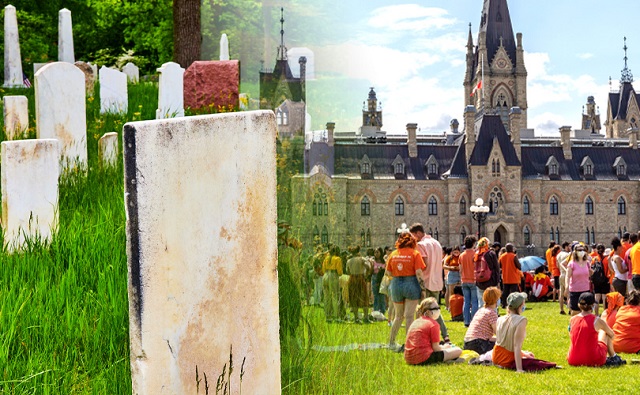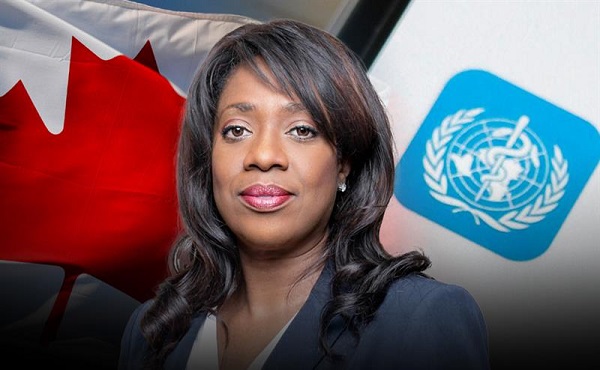National
Despite claims of 215 ‘unmarked graves,’ no bodies have been found at Canadian residential school

From LifeSiteNews
Over 100 churches have been burned or vandalized since the Trudeau government and mainstream media promulgated, without any physical evidence, the narrative that mass ‘unmarked graves’ had been discovered at Kamloops Indian Residential School.
Canada’s Department of Crown-Indigenous Relations has confirmed it has spent millions searching for “unmarked graves” at a now-closed residential school once run by the Catholic Church, despite the fact that no human remains have been found.
In total, some $7.9 million was earmarked for a search of unmarked Indian Residential School graves in Kamloops, British Columbia. According to the spokeswoman for the Crown-Indigenous Relations, Carolane Gratton, the community got the money “for field work, records searches and to secure the Residential School grounds.”
“Details of initiatives taken by Tk’emlups te Secwepemc First Nation are best directed to the community,” noted Gratton.
To date, the Department of Crown-Indigenous Relations has not given a financial accounting under the Access To Information Act as to where the money went. According to the Tk’emlups te Secwepemc First Nation, it “continues to grieve children that are in our care and are focused on the scientific work that needs to be done,” but made no mention of the $7.9 million.
In 2021 and 2022, the mainstream media ran with inflammatory and dubious claims that hundreds of children were buried and disregarded by Catholic priests and nuns who ran some of the schools.
The Tk’emlups te Secwepemc First Nation was more or less the reason there was a large international outcry in 2021, when it claimed it had found 215 “unmarked graves” of kids at the Kamloops Residential School. The claims of remains, however, were not backed by physical evidence, but were rather disturbances in the soil picked up by ground-penetrating radar.
The money given to the First Nation was done so to find the “heartbreaking truth” of the residential school system, according to a 2022 Indian Residential School Sites: Unmarked Burials department briefing note.
“Our thoughts are with survivors, their families and communities as the heartbreaking truth about Residential Schools’ unmarked burials continues to be unveiled,” read the note.
“Funding is available to support communities, survivors and their families on their healing journey through researching, locating and memorializing those children who died while attending Indian Residential Schools.”
Canadian indigenous residential schools, while run by both the Catholic Church and other Christian churches, were mandated and set-up by the federal government and ran from the late 19th century until the last school closed in 1996.
While there were indeed some Catholics who committed serious abuses against native children, the past wrongs led to widespread anti-Catholic sentiment, which boiled over in the summer of 2021 after the discovery of the 215 so-called “unmarked” graves in Kamloops.
While some children did die at the once-mandatory boarding schools, evidence has revealed that many of the children tragically passed away as a result of unsanitary conditions due to the federal government, not the Catholic Church, failing to properly fund the system.
No human remains have been found
Soon after the Kamloops announcement in 2021, other regions claimed the presence of “unmarked graves,” which prompted Canada’s House of Commons under Liberal Prime Minister Justin Trudeau, with the help of all other parties including the Conservatives, to declare the residential school program a “genocide” despite the lack of evidence.
The reality is that to date, no human remains have been found at the Kamloops site or other sites.
In fact, in August 2023, the Pine Creek Residential School, located in Pine Creek, Manitoba, underwent a four-week excavation and yielded no remains.
The excavation was led by a First Nation’s tribe called Minegoziibe Ashinabe, and came after a total of 14 abnormalities were found at the former school by ground-penetrating radar.
There have been other excavations conducted at residential schools that have likewise turned up no human remains.
Since the spring of 2021, over 100 churches, mostly Catholic, have been burned or vandalized across Canada. The attacks on the churches came shortly after the “unmarked graves” narrative began.
Despite the church burnings, the federal government under Trudeau has done nothing substantial to bring those responsible to justice or to stem the root cause of the burnings.
“I think Canadians have seen with horror those unmarked graves across the country and realize that what happened decades ago isn’t part of our history, it is an irrefutable part of our present,” Trudeau had earlier remarked to reporters.
The unmarked graves controversy also spurred a Senate committee in 2023 to claim that anyone who questions the graves is engaged in “Residential School denialism.”
“Denialism serves to distract people from the horrific consequences of Residential Schools and the realities of missing children, burials and unmarked graves,” said a Senate Indigenous peoples committee report titled Honouring The Children Who Never Came Home.
The Senate committee report said that the Canadian government should “take every action necessary to combat the rise of Residential School denialism.”
Jordan Peterson tells Pope Francis to ‘take note’
Responding to reports about the Trudeau government spending nearly $8 million without finding a single body, renowned anti-woke Canadian psychologist Jordan Peterson took a shot at Pope Francis.
“Pope Francis take note @Pontifex,” wrote Peterson on X (formerly Twitter) last Thursday.
Pope Francis take note @Pontifex https://t.co/YAyKDtMa4A
— Dr Jordan B Peterson (@jordanbpeterson) May 9, 2024
Peterson’s remarks likely came in light of the fact that Francis visited Canada in the summer of 2022 for the purpose of apologizing for churchmen’s role in the operation of the residential school program.
During his July 2022 trip, Francis visited First Nations in Alberta and Quebec. While in Quebec, he seemed to join in on a pagan “smudging” ritual before giving a lengthy speech where he conveyed “deep shame and sorrow” for the role played by Catholic Church members in government-funded residential school abuses.
While Francis seemed to go along with the mainstream narrative regarding residential schools, others have spoken out.
Last year, retired Bishop of Calgary, Frederick Henry, blasted the blatant “lie” that thousands of missing indigenous children who attended residential schools run by the Catholic Church were somehow “clandestinely” murdered by “Catholic priests and nuns.”
The founder of the National Post, Conrad Black, also made similar statements as Henry in an opinion piece for his former paper, calling the entire narrative a “fraud.”
Business
The Liberal budget is a massive FAILURE: Former Liberal Cabinet Member Dan McTeague

Prime Minister Mark Carney tabled his government’s long-overdue budget yesterday and took the same approach as his predecessor – spend, spend, spend.
Canada’s deficit is now a staggering $78 BILLION. To make matters worse, Carney doubled down on the industrial carbon tax.
Dan McTeague explains in his latest video.
Daily Caller
US Eating Canada’s Lunch While Liberals Stall – Trump Admin Announces Record-Shattering Energy Report


From the Daily Caller News Foundation
By Audrey Streb
The Department of Energy (DOE) touted a report on Wednesday which states that America broke records in liquefied natural gas (LNG) exports.
The U.S. became the first country to export over 10 million metric tonnes of LNG in one month in October, Reuters reported on Monday, citing preliminary data from the financial firm LSEG. The DOE posted on X on Wednesday that “there are big opportunities ahead for U.S. natural gas” and has consistently championed LNG in a sharp departure from former President Joe Biden’s crackdown on the resource.
“The fact that America’s oil and gas industry was able to pass this stunning milestone is impressive considering all the roadblocks to progress which were thrown up by the Biden administration,” David Blackmon, an energy and policy writer who spent 40 years in the oil and gas business, told the Daily Caller News Foundation. “It is a testament to both the resilience and innovative mindset of the industry and to the phenomenal wealth of America’s natural gas resource.”
Dear Readers:
As a nonprofit, we are dependent on the generosity of our readers.
Please consider making a small donation of any amount here.
Thank you!
🗣️RECORD BREAKING: For the first time, U.S. LNG exports are projected to surpass 10 million metric tons in a single month. There are big opportunities ahead for U.S. natural gas!
— U.S. Department of Energy (@ENERGY) November 5, 2025
Two facilities in Louisiana and Texas are responsible for the LNG export surge, according to Reuters. The U.S. LNG industry emerged as an energy sector giant in recent decades, with America now leading the world in LNG exports after being projected to be a net importer as late as 2010, according to S&P Global.
The Biden administration enacted a freeze on new LNG export permits and “intentionally buried a lot of data and released a skewed study to discredit the benefits of American LNG,” the DCNF previously reported. The environmental lobby applauded Biden’s January 2024 freeze on new LNG export terminals, though critics argued that the policy stalled investment, would not reduce emissions and undermined America’s global strategic interests.
In contrast, President Donald Trump sought opportunities to bolster LNG and reversed the new permit pause through a day-one executive order. Some energy policy experts told the DCNF that the reported milestone highlights the resiliency of the industry and the benefit of Trump’s “American energy dominance” agenda.
-

 Business2 days ago
Business2 days agoTrump’s Tariffs Have Not Caused Economy To Collapse
-

 Alberta1 day ago
Alberta1 day agoAlberta government’s plan will improve access to MRIs and CT scans
-

 Daily Caller2 days ago
Daily Caller2 days agoTrump Reportedly Planning Ground Troops, Drone Strikes On Cartels In Mexico
-

 Brownstone Institute2 days ago
Brownstone Institute2 days agoBizarre Decisions about Nicotine Pouches Lead to the Wrong Products on Shelves
-

 Health2 days ago
Health2 days agoRFK Jr’s argument for studying efficacy of various vaccines
-

 International2 days ago
International2 days agoHours after Trump’s warning, Nigerian Christians massacred by Islamist gunmen
-

 Business1 day ago
Business1 day agoCarney government’s first budget should signal end to crippling ‘climate’ policies
-

 Business1 day ago
Business1 day agoNo Jobs Clause: Liberals Under Fire Over Stellantis Deal in Fiery Committee Showdown











